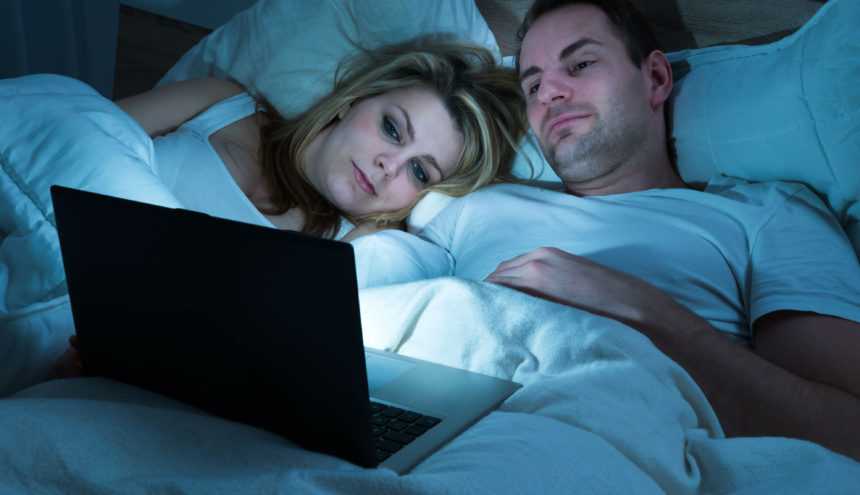 By Joe Schneiderhan, O.D., Optometrist, Glenwood Family Eye Center
By Joe Schneiderhan, O.D., Optometrist, Glenwood Family Eye Center
“Wait 30 minutes before you swim!” Do you remember your mom telling you this after a big meal? Here’s a new piece of advice that is relatively new – “Wait 1-2 hours before you go to bed.” Wait, what? Yes, you read that correctly. Rather, it should read “go screen-free 1-2 hours before going to bed.”. This means smartphones, computers, tablets, and even the TV. It’s for your own good. Simply put, your eyes need a break from artificial blue light before going to bed if you want a restful night sleep.
We know technology can be a good thing, a time-saver and often a life-saver. As technology advances, we rely more and more on man-made things. The LED (light emitting diode) technology in our energy-efficient light bulbs, televisions, computers, and phones emit high energy visible aka blue-violet light and can seriously damage our eyes. Blue-violet light is actually very close to ultraviolet (UV) light which we already know to be harmful.
How does this affect your sleep? Blue-violet light is one of nature’s colors. After all, what color is the sky? Blue light lets our bodies know it’s daytime. The “high energy visible”, short wavelengths are on the far end of the color spectrum and we feel energized, alert and awake. Blue light helps to regulate our sleeping pattern because when we see blue light, melatonin production is suppressed. Melatonin is the drowsy-causing hormone in our body and gets us ready for sleep. When we are exposed to blue-violet light at the wrong time of day via television, computer, and phone, it negatively impacts our sleep cycle. These are artificial forms of blue light, exposed to us at the wrong time of day when we’re catching up on social media, emails, and late night television.
Think about the sun going down, and how the blue sky takes on a reddish hue. These warm, calming colors are at the opposite end of the color spectrum (remember ROYGBIV) and have “low energy visible”, long wavelengths. When these lights are present (blue light is absent) cells in our retina turn on and send a signal to the brain telling the pineal gland to start producing melatonin. Again, when melatonin is produced, it lets us know it’s time for rest. Light wavelengths give us our sense of day or night (wake or sleep). For those of us who are creatures of habit, our sleep cycle and circadian rhythm become set to those times.
As was mentioned earlier, blue-violet light is very close in wavelength to ultraviolet light. If we are exposed to it in large, repeated doses it is a well-known hazard. Studies have revealed that UV light can cause retinal cell death, contribute to cataract formation, and accelerate retinal damage in those who have macular degeneration. It is believed that too much of these short UV and blue-violet wavelengths impair metabolic cell function in the retina. People with macular degeneration and those at risk for it should take precautions to protect themselves against the damaging effects that blue light may have on the retina.
Eyes of every age and stage are vulnerable to the dangers of blue light. We are simply exposed to way too much of it through digital eye strain. Some phones come with a built-in feature called a blue light shield or you can download an app to get similar results. Turning the brightness all the way down isn’t the same and your eyes will still feel the strain. If you wear eyeglasses, ask your eye doctor or optician about lenses that filter blue-violet light. It is one more way to protect your eyes and significantly limit the amount of artificial blue-violet light you are exposed to by the end of the day.
If you absolutely cannot give up your late night TV, just limit it… everything in moderation. It is better to watch an hour of TV than stare at your smartphone for an hour due to the sheer distance from your eyes, even with the filters turned on. If you like to read before going to bed, grab a book instead of an e-book for a while. Give it a couple weeks and see if you notice the positive physical changes from getting better sleep.


